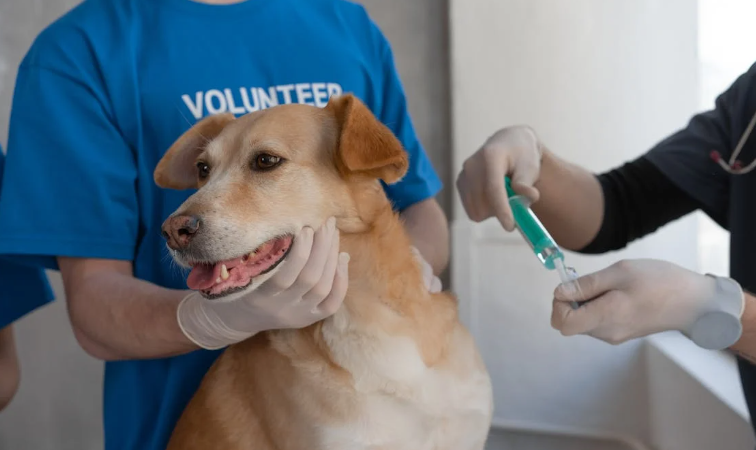Leptospirosis Symptoms in Dogs

Introduction:
Leptospirosis, a bacterial infection transmitted through contact with infected animals or contaminated environments, can pose a serious health risk to dogs. Often nicknamed “kennel fever” due to its potential spread in crowded settings, leptospirosis can be a silent threat, with symptoms ranging from mild to life-threatening. This blog post will delve into the world of leptospirosis symptoms in dogs, equipping you with the knowledge to protect your furry friend from Leptospirosis Symptoms.
Understanding the Enemy: The Leptospira Bacteria
Leptospirosis is caused by a corkscrew-shaped bacterium called Leptospira. These bacteria can survive for weeks in warm, moist environments, particularly in stagnant water sources like puddles, lakes, or even damp soil. Infection occurs when a dog ingests contaminated water or food, or through contact with infected wounds or mucous membranes (eyes, nose, mouth).
The Spectrum of Leptospirosis Symptoms in Dogs: From Subtle to Severe
The tricky aspect of leptospirosis is its wide range of symptoms. Some dogs may not exhibit any signs at all, while others can develop a full-blown illness. The severity also depends on the specific strain of bacteria involved and the dog’s overall health.
Early Signs (Can Last 4-12 Days)
- Lethargy and weakness
- Loss of appetite
- Fever
- Shivering
- Muscle soreness and stiffness
- Vomiting and diarrhea

Later Signs (If Left Untreated)
- Jaundice (yellowing of the gums, skin, and whites of the eyes)
- Increased thirst and urination
- Dehydration
- Difficulty breathing
- Nosebleeds or blood in vomit, urine, or stool
- Abdominal pain
- Swelling of the legs
Protecting Your Pup: Prevention is Key
Vaccination is the cornerstone of preventing leptospirosis. The leptospirosis vaccine is typically included in routine puppy vaccinations and booster shots for adult dogs. Discuss the vaccination schedule with your veterinarian to ensure your dog receives the necessary protection.
Beyond Vaccination: Minimizing Risks
- Limit exposure to stagnant water: Avoid allowing your dog to drink from puddles, ponds, or lakes.
- Practice good hygiene: Keep your dog’s living area clean and disinfect any areas potentially contaminated with urine from infected animals.
- Be mindful at dog parks and boarding facilities: Ask about the leptospirosis vaccination status of other dogs before letting your dog interact with them.
- Maintain a healthy lifestyle: A well-nourished dog with a strong immune system is better equipped to fight off infections.
Early Diagnosis and Treatment: Crucial for Recovery
If you suspect your dog may have leptospirosis, seek immediate veterinary care. Early diagnosis and treatment are essential to prevent complications and improve the chances of a full recovery. Diagnosis typically involves blood tests, urine analysis, and sometimes abdominal ultrasounds.
Treatment for leptospirosis usually involves a combination of antibiotics, intravenous fluids, and medications to manage specific symptoms like vomiting or kidney failure. The duration of treatment depends on the severity of the illness.
Living with a Leptospirosis Survivor
Following recovery, regular checkups with your veterinarian are crucial to monitor your dog’s kidney and liver function, as these organs can be affected by the infection. Long-term complications are rare, but some dogs may experience lingering muscle weakness or scarring in the kidneys or liver.
Frequently Asked Questions (FAQs) About Leptospirosis in Dogs
- Can humans get leptospirosis from dogs?
Yes, leptospirosis can be transmitted from dogs to humans, but it’s relatively uncommon. Practicing good hygiene and avoiding contact with your dog’s urine or mucous membranes while they are sick can significantly reduce the risk.
- Is the leptospirosis vaccine completely effective?
No vaccine is 100% effective, but the leptospirosis vaccine offers significant protection against the most common strains of the bacteria.
- How long does a dog stay contagious after being infected with leptospirosis?
The bacteria can be shed in the urine for several weeks or even months after infection. It’s important to consult your veterinarian for guidance on preventing the spread of the infection to other animals.
- What are the long-term health effects of leptospirosis in dogs?
In some cases, leptospirosis can lead to chronic kidney disease or liver problems. Regular veterinary checkups are essential to monitor for these potential complications.
Conclusion: Knowledge is Power in Protecting Your Dog
By understanding the risks of leptospirosis symptoms in dogs , taking preventive measures like vaccination, and being observant of your dog’s health, you can significantly reduce the chances of your furry friend contracting this potentially serious illness. Remember, early detection and treatment are key to a full recovery. If you have any concerns about leptospirosis or your dog’s health in general, don’t hesitate to consult your veterinarian. They are your best resource for keeping your canine companion happy and healthy!
For further information, please don’t hesitate to visit our website.




